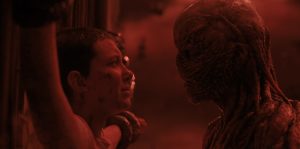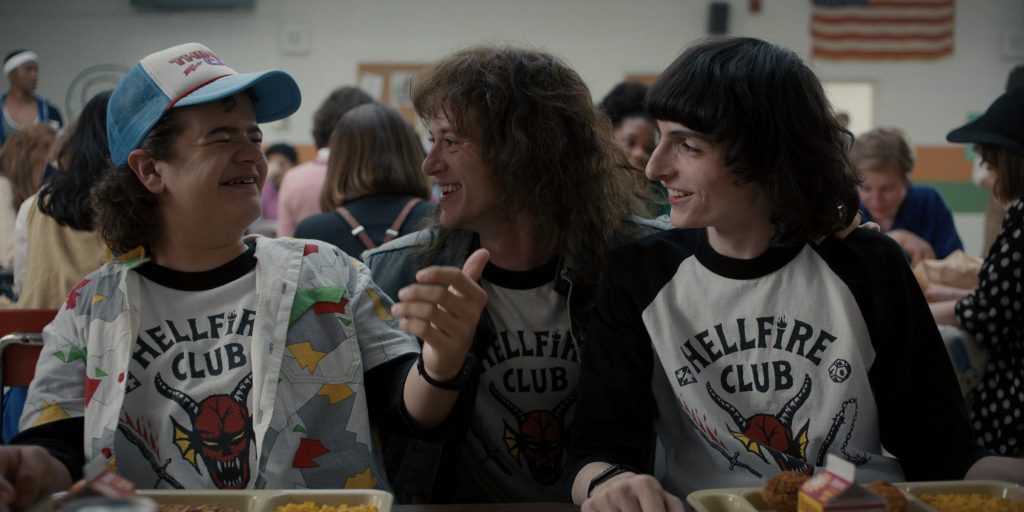When the Netflix show “Stranger Things” premiered in the summer of 2016, it was a surprise nostalgia-fueled hit. But more important to its success: it was charming. And ultimately, despite its focus on nerdy outcasts, it was an ode to the power of traditional community and intact families.
Consider the adult leads. In many 1980s films, the theme of divorce looms large, while united parents are written as square and reactionary. In a similar vein, the only sympathetic, competent adults in “Stranger Things” tend to be single parents, allies to their free-spirited children. But season one does something interesting with that convention.
Loving father Chief Jim Hopper (David Harbour) and devoted mom Joyce Byers (Winona Ryder) form a team which is, archetypally, a united family. The two of them ultimately descend into hell to rescue Joyce’s son. The shot where they resurrect and cradle him is striking cinematic iconography. In that moment, even while each is unmarried, they typify a complete family, rebuking corrupt, indifferent parents not through their singleness, but through their unity. This, the show asserts, is how families should be.
Subsequent seasons have lost that vision. Increasingly glorifying rebellious loners instead of recognizing the beauty of united communities has kneecapped each season, even the ambitious and engrossing new volume. At least the power of friendship is still important, but volume four’s mythology is so sprawling that it overshadows the sorts of community bonds that were concretely established in season one.
On the other hand, there are some bonds that are well-developed in the show. Now that Mike (Finn Wolfhard), Dustin (Gaten Matarazzo), and Lucas (Caleb McLaughlin) have moved on to Hawkins High, they’ve been inducted into the high school “Hellfire” Dungeons & Dragons Club. While Lucas defects to the basketball team, Mike and Dustin fall under the sway of charismatic Hellfire leader Eddie Munson (Joseph Quinn), a metalhead 19-year-old who’s flunked two years of school.
Eddie recognizes Dustin and Mike as “the future of Hellfire” and describes the gawky freshmen as “little lost sheep” (a later, similar line will make his Christ figure status unmistakable). He is a saint of loserdom, ranting loudly in the cafeteria about “forced conformity” being “the real monster,” not the Satanic Panic sweeping 1980s America. (He follows this rant against conformity by bullying Mike and Dustin into doing things his way.)
The only thing is … Satan? He really is stalking the streets — or understreets — of Hawkins. The season’s new villain is “Vecna” (Raphael Luce as a child and Jamie Campbell Power as an adult), a grim serial-killing monster who gruesomely murders teenagers. Vecna’s demonic psychological sway represents a significant escalation in evil from previous seasons’ creepy-crawly monsters. The lack of a countervailing power of good is therefore a great weakness in the show. The devil is real in “Stranger Things,” but God is not. Despite some interesting but weightless dialogue about “miracles,” the Church is merely a blind institution full of ignorant townspeople.
What’s interesting here is that “Stranger Things” lacks categories for good and evil, so it translates them instead to “normal” (bad) and “marginalized” (good). For the most part, the “normal” people in the show are uniformly monstrous. Eleven (Millie Bobbie Brown) is bullied by Angela (Elodie Grace Orkin) and her pack of mean girls. Jason (Mason Dye), the anti-Eddie, is a blond basketball captain who reads his lines like a Southern preacher. He is seen as a psychopathic bigot, even though, by the show’s internal logic, he’s making reasonable assumptions about the evil in his town.

Jason is a vigilante, but so are Nancy (Natalia Dyer) and her friends. But in Jason’s case, his vigilantism is perceived as villainous because he is slightly off about the culprit’s identity. And really, because he is normal. At least the characters praise Joe Keery’s jock Steve Harrington, but that’s a weak concession; Steve transcends his identity by being a toothless, albeit sweet, nerd ally.
Ignoring the good-evil distinction also saps the tension from the existential crisis facing Eleven. Having internalized the logic of conformity, she — who is not a murderer — wonders whether she is truly a monster because she’s socially awkward, or if her “father” — a murderous but suave scientist — is. Gee, wonder what the answer is?
Eventually Eleven realizes that it’s the abused “monsters” like herself who are righteous, not their abusers. But this logic — still free of good and evil distinctions — leads her to offer absolution to an actual monster! (In the immortal words of Indiana Jones, “Didn’t you guys ever go to Sunday School?”)
The lack of a concrete (probably religious) sense of good is also problematic for the show’s strongest, most affecting storyline: the stalking of Vecna’s victims. They are outside of the jock-nerd distinction. Previously, “Stranger Things” monsters picked off whoever happened to be around. This time, Vecna hunts the emotionally vulnerable, as all predators do.
It’s a terrifyingly perfect threat for high-schoolers, for the fantasy logic of Vecna’s hunt is a perfect metaphor for teen suicidal ideation. He lies to them about their worth, watches them spiral, then moves in for the kill. It’s Screwtape 101. Kids, full of hormones and oversized emotions, are the perfect prey for a demon.
Tomboy Max Mayfield (Sadie Sink) is his key target. Despite her spunk, Max is at heart the most fatalistic and sensitive of the Hawkins kids because she has been burdened by far more adult struggles. Her journey this season is engrossing and (in that one scene) empowering, but its grim resolution undermines what comes before. Totemic pieces of ’80s pop culture aren’t really strong enough to beat the devil, it turns out.
But at least the showrunners, brothers Matt and Ross Duffer, seem to know that. They are aware, in the end, that these characters need something stronger to combat evil than pop culture, and that being an outsider does not always make one righteous. Yet what else is there?
In season five, the Duffers will need to be more honest about the limitations of righteous loner logic. The show should take the time to let character moments breathe (more of Eddie and a cheerleader awkwardly flirting, less endless exposition), restore healthy authority figures (bring back Smart Hopper!), and be comfortable with united families (less bickering, more bantering). These changes would go a long way toward creating a community network that feels real. After all, that is the thing that stops teenage spiraling in real life.
It also wouldn’t hurt, when the devil is at the door, for the Hellfire Club to go to Sunday School.

